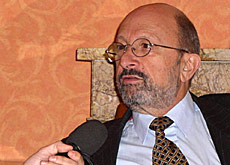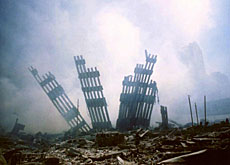Panel investigates impact of war on terror

An independent panel of legal experts – including Switzerland's Stefan Trechsel – is to carry out a global inquiry into the impact of counter-terrorism measures.
The 18-month investigation, set up by the Geneva-based International Commission of Jurists (ICJ), will examine to what extent the war on terror has undermined basic human rights and the rule of law.
“Governments are adopting ever-new counter-terrorism measures and they are saying that the rules have changed in the fight against terrorism,” Nicholas Howen, secretary-general of the ICJ, said on Tuesday.
“We are launching an eminent jurists panel because we cannot accept at face value what governments are saying to us, especially because over the past four years we have seen an acceleration of very serious human rights issues in the fight against terrorism.”
The ICJ says it is particularly concerned about the re-emergence of torture and ill-treatment as a justified means of extracting information. They also highlighted indefinite and secret detentions of terrorist suspects often without charge or trial, and reduced rights of fair trial.
The eight-strong panel, which includes the former United Nations High Commissioner for Human Rights, Mary Robinson, is due to conduct a series of hearings in countries that have faced cycles of terrorism and “excessive responses”.
The United States, Russia, Britain, Pakistan, Colombia, Australia, Sri Lanka and Spain all feature on the list. In addition, there will be sub-regional hearings in East Africa, North Africa, the Middle East and South America.
Swiss funding
The panel, which has received funding from Switzerland, Spain and Norway, says it wants to listen to the experiences of lawyers, judges, government officials and human rights advocates.
“There is a certain tendency that now things have changed, you can do anything as long as it’s directed against terrorism,” Trechsel, a former president of the European Court of Human Rights, told swissinfo.
“This is something that is definitely not acceptable and which, in my personal conviction, is counter-productive. It breeds terrorism and that must be avoided.”
Trechsel said it would be naïve to imagine that the inquiry’s final report would lead to policy changes, but he believed its findings could make it more difficult for governments to justify what they were doing.
This view is endorsed by the panel’s chairman Arthur Chaskalson, president of the ICJ and former chief justice of South Africa.
He said he hoped the report would be taken seriously and would contribute to the debate on matters which were of fundamental importance and which should not be “swept under the carpet”.
“We understand the imperative of governments to be able to afford protection to their citizens, but it is of the greatest importance that minimum standards which have been established through history are respected,” he said.
swissinfo, Adam Beaumont in Geneva
The members of the panel are:
Arthur Chaskalson (South Africa), Georges Abi-Saab (Egypt), Robert K Goldman (United States), Hina Jilani (Pakistan), Vitit Muntarbhorn (Thailand), Mary Robinson (Ireland), Stefan Trechsel (Switzerland), Raúl Zafforani (Argentina).
Stefan Trechsel was born in Bern in 1937 and was professor of law at St Gallen University (1979-1999) and Zurich University (1999-2004).
He was elected to the European Court of Human Rights in 1975 and was its president from 1995 to 1999.

In compliance with the JTI standards
More: SWI swissinfo.ch certified by the Journalism Trust Initiative











You can find an overview of ongoing debates with our journalists here . Please join us!
If you want to start a conversation about a topic raised in this article or want to report factual errors, email us at english@swissinfo.ch.